A conservative and two liberals swapped news feeds. It didn’t end well.
Each morning when his wife leaves to work out at the gym, Tom Herbon turns on the radio in his basement wood shop. For much of the day as he works around his home in Troy, north of Detroit, Herbon listens to WDTK 101.5 FM, “The Patriot,” a conservative talk radio station featuring commentators including Sean Hannity and Mike Gallagher. From 1-3 p.m., he switches stations to hear Rush Limbaugh.
Several times a day, he’ll fire up his desktop computer and read the latest news on the Drudge Report, the conservative news aggregation website that gets more than 25 million pageviews a day.
“I’m a Donald Trump Twitter follower,” said Herbon. “I want to hear directly from the horse’s mouth instead of it being misrepresented by the biased media.”
More coverage: Interactive Map: What political bubble do you live in?
Fifty miles away, a different soundtrack plays in the Ann Arbor home of Aric Knuth and Jim Leija. After work, the couple listens to NPR while cooking and eating dinner. Typically, NPR’s news programs including “All Things Considered” play in the background for three hours each evening. Knuth and Leija, who voted for Hillary Clinton for president, read the New York Times.
“I have the app (for the New York Times) on my phone,” Knuth said. “I check headlines at least six times a day.”
The Ann Arbor couple had never seen the Drudge Report. The Troy retiree had seldom listened to NPR.
That was about to change.
Herbon, Knuth and Leija were all born in Michigan, are college educated, own beautiful homes and have upper-middle class incomes. Yet their world views are polar opposites. One aspect of their lives that divides them: their sources of news.
Michigan Divided
The 2016 presidential election deepened fault lines in Michigan. Bridge is following 11 people and families throughout 2017 in an effort to understand – and pierce – the political and cultural bubbles in which we too often live. Herbon, Knuth and Leija are participating in the project.
A generation ago, it’s safe to say most Michigan residents got their news from the same local newspapers as their neighbors, and from nightly news shows on three broadcast networks. Today, conservatives in Copper Harbor can glide from car radio to smartphone to laptop gorging on a diet of Benghazi, Obama phones and pedophile pizza conspiracies. Meanwhile, progressives in Port Huron can spend the day swaddled in podcasts and Facebook feeds assailing the intelligence of Trump voters and speculating when impeachment hearings will begin.
The conservative Herbon and liberals Knuth and Leija don’t deal in conspiracy theories or smug dismissiveness of those with whom they disagree. But the yawning gap between the media sources of these three voracious news consumers makes it difficult for them to find common ground.
To try to understand each other more, Herbon, Leija and Knuth agreed to swap news sources for one week.
It didn’t go well.
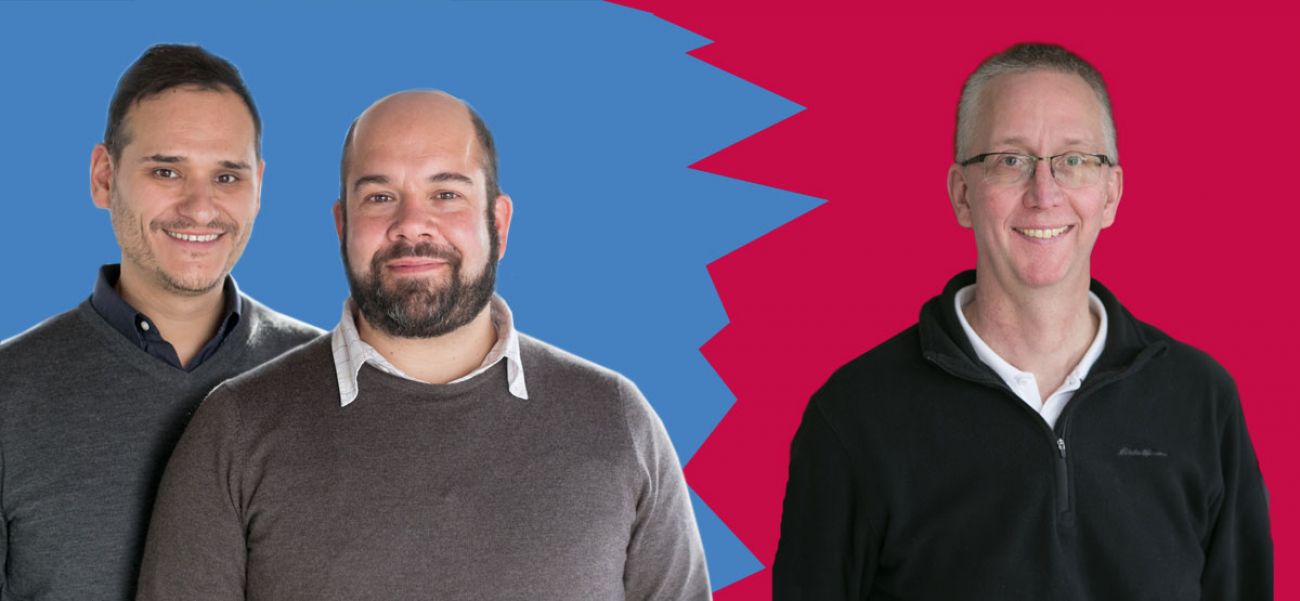
The news bubble swap
Herbon is a 57-year-old retired engineer. He is conservative financially, regaling visitors with the story of packing a peanut butter and jelly sandwich for work every day for 17 years. If possible, and Herbon proves that it is, he is even more conservative politically. On Nov. 6, he tied a homemade, 32-square-foot sign supporting Donald Trump to the back of his minivan and parked it outside his polling place.
He is quick with self-effacing jokes, admitting that some likely view him as a “whack job,” and just as quick to label some liberals as “idiots.”
Herbon’s news habits veered to the right during the contentious presidential election between now-President Trump and Hillary Clinton. Before the election, Herbon’s daily routine was to listen to “The Today Show” each morning. He’d record the “NBC Nightly News” and watch it later in the evening with his wife, Janet.
About two weeks prior to the election, Herbon’s routine changed. The Today Show, Meet the Press and NBC News “felt too slanted,” he said. “It isn’t representative of the real news and facts.”
Listening or reading traditional media “made me sick,” Herbon said. “It affects my health. I had to turn it off because I got so irate I literally feel like I want to kill somebody.”
Starting a few weeks before the November presidential election and continuing today, Herbon gets his news primarily from the conservative site Drudge Report. He doesn’t watch TV news, opting instead to work around the house with “The Patriot” talk radio playing in the background.
“Maybe they’ve (traditional media) always been biased,” Herbon said, “but we didn’t’ have a conservative checkpoint to check it against.”
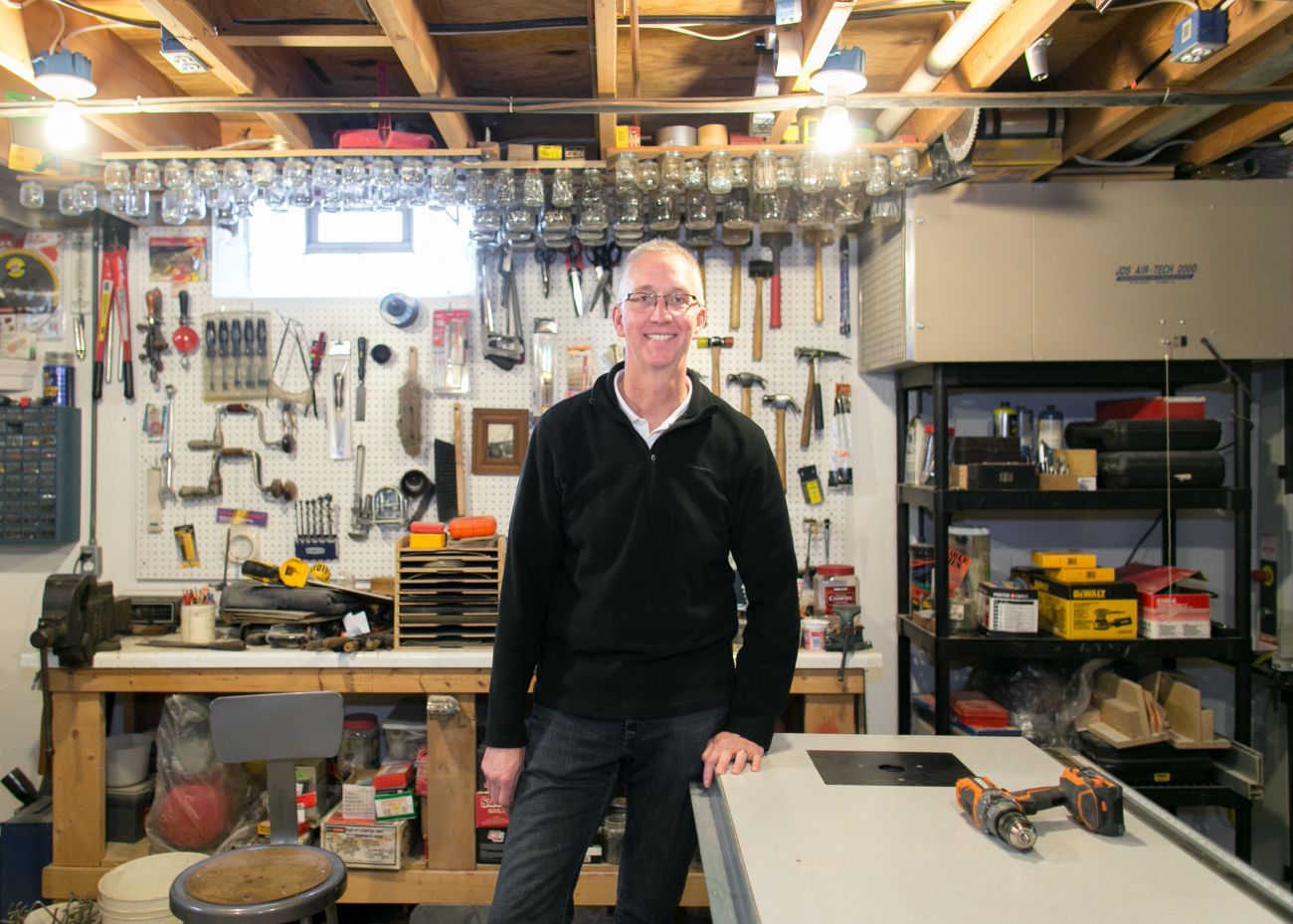
Leija and Knuth both work for the University of Michigan in Ann Arbor, and their temperaments match the measured, low-key voices they hear each evening on NPR (National Public Radio), which they listen to on public radio station WUOM, 91.7-FM, better known as Michigan Radio.
Knuth is a lecturer in the English Department and director of the New England Literature Program, and Leija is director of education and community engagement for the University Musical Society.
Read more about Jim Leija and Aric Knuth
Like the conservative Herbon, the unabashed liberal couple tweaked their news habits in the wake of the presidential election.
“We subscribed to the New York Times,” Knuth said. “We felt we needed to read more than we were getting in our 10 free articles a month.”
Beyond the Times and NPR, Leija reads Jezebel, a decidedly feminist-focused blog featuring a mix of opinionated news and entertainment. (The lead story recently was headlined “The T-Rex was a Vicious Predator, but a Gentle and Caring Lover.”)
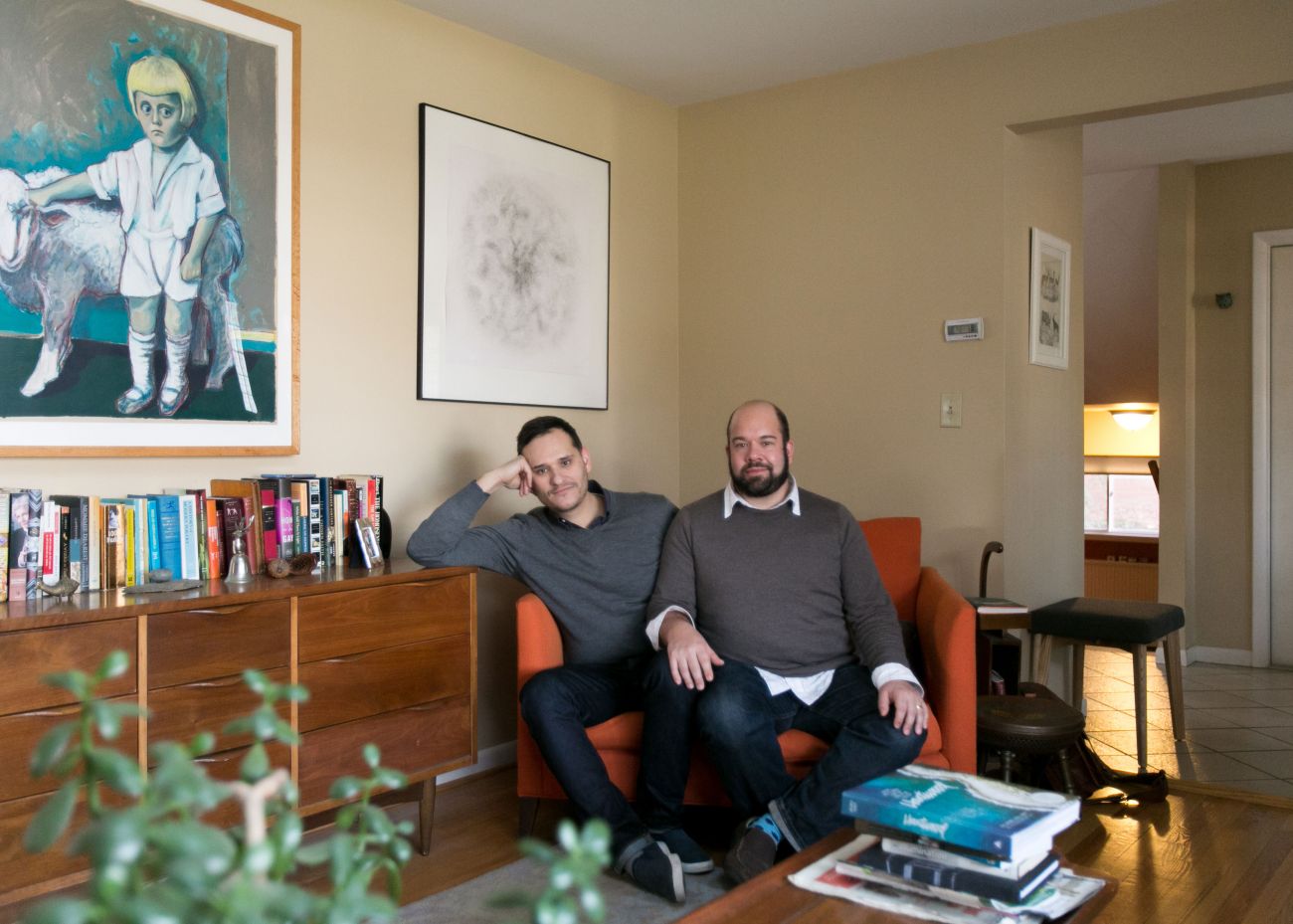
Knuth and Leija agreed to switch from listening to NPR to The Patriot talk radio. Instead of compulsively checking the New York Times multiple times a day, the pair would only look at Drudge Report.
After some hesitation, Herbon agreed to turn his radio to a station that carried NPR programming. Instead of reading Drudge online, he would peruse the New York Times website and Jezebel.
Knuth and Leija were enthused about the project. “I love experiments,” Knuth said.
Herbon was wary. “I don’t know if I can make it a week,” he said.
"I AM OUT"
I sent Herbon, Knuth and Leija instructions for their roles in the news bubble swap on Thursday, March 16. The experiment was to begin Monday, March 20 and run through the following Sunday.
The instructions were emailed at 9:23 a.m.
Thirty-one minutes later, Herbon emailed to say he already regretted agreeing to swap news feeds.
"I just looked at jezebel.com," Herbon wrote. "The headline "Federal Judge in Hawaii Blocks Trump's Second Travel Ban Just in the Nick of Time" and ensuing article is total biased crap. I specifically chose "total crap" because NO respectable news feed I listen to, read or watch describe things as 'shitty.'
"Without even spending another second on this project I can tell you the result," Herbon said. "…God help us."
At 11:39 a.m. the same day, Herbon sent a second email. He’d looked at more articles on Jezebel and checked out the New York Times website.
“I browsed more of jezebel.com and cannot believe what I am reading,” he wrote. “This site is nothing more than a ranting website for the lunatic fringe that shows NO RESPECT for anything or anybody. I have no interest in punishing myself by interacting for another second with this website.”
At the New York Times, Herbon took offense at an article that referred to a Trump rally as “angry” and “xenophobic.”
“I thought this activity would be interesting and fun but there is nothing fun about subjecting myself to such irresponsible drivel for another second let alone another week,” Herbon wrote. “I will NEVER look at that Jez… website again. Life is too short to waste another second going to a website that treats the release of celebrity nude photos (Herbon was likely referring to this article) with more respect than the President of the United States.
“The NY Times does not print accurate facts in areas I know, so I have no confidence or interest in reading about things I don’t know because I cannot believe what I read.”
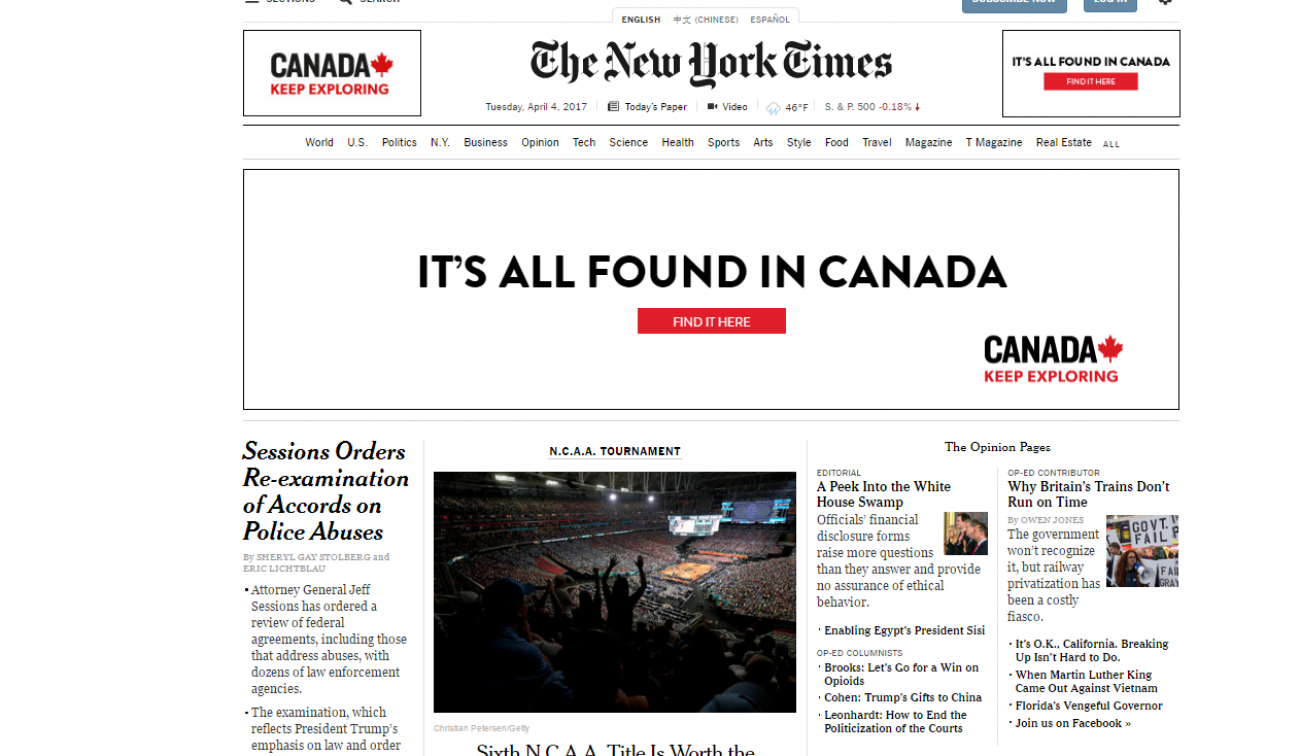
At 2:53 p.m. that same day, four days before the experiment was to begin, Herbon sent a third email:
“So there is no confusion, I am OUT of the print experiment,” Herbon wrote. “The sources you wanted me to review are so un-American and so out of touch with real America I cannot support them in any way shape or form.”
‘A nightmare’
In Ann Arbor, Knuth and Leija stuck with the news swap for five days before giving in to temptation and checking the New York Times for updates on the Affordable Care Act repeal bill being debated in the House of Representatives.
Trying to keep up with the world by only reading the Drudge Report was “a nightmare,” Leija said. Drudge aggregates news stories from multiple sources on the Internet and places them in a list with the same, small headline size.
“I found it hard over the course of the week to know what the important stories were,” Leija said. “I felt under-informed because all that tiny text creates a sense of not being able to tell what is important. It was depressing in a strange way.”
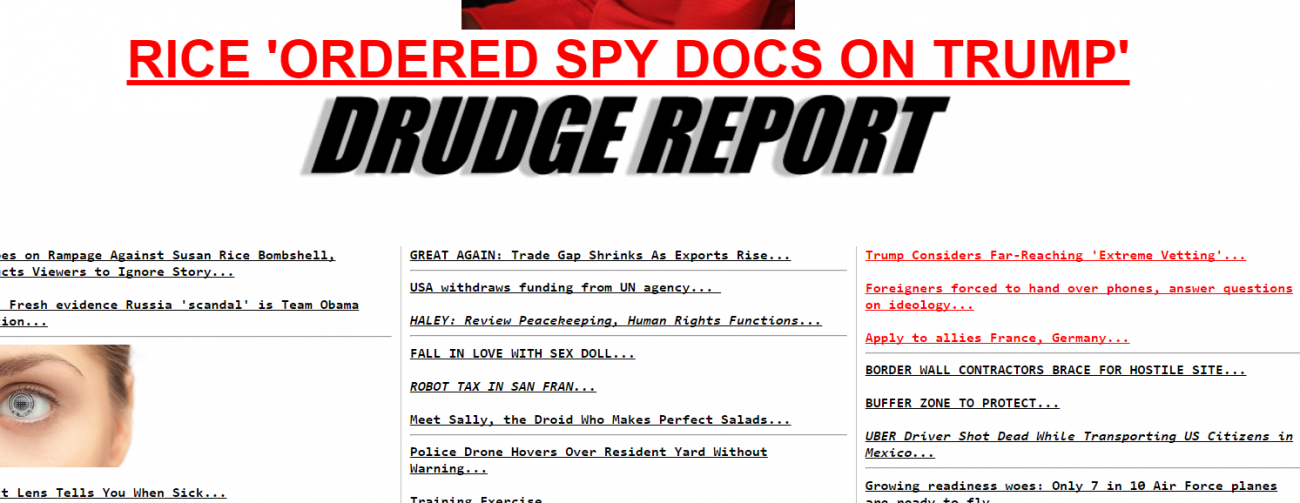
“You have really important stories all mixed up with really unimportant stories on the same list,” Knuth added. “I just didn’t understand how that could ever be a helpful tool for understanding what’s happening in the world.”
Knuth listened to The Patriot hours each day. “I was shocked,” Knuth said. “I had never listened to a radio station like that before. I was shocked to see that it was actually just a series of programs of Rush Limbaugh-type guys. It was wall-to-wall programming of these cranky personalities, who were engaged mainly in complaining.”
After years of listening almost exclusively to public radio, which does not take advertising, Knuth was disturbed by the amount of air time taken up by ads on The Patriot, including one ad he heard repeatedly featuring former congressman and presidential candidate Ron Paul hawking a food dehydrator.
“I was just constantly frustrated.” Knuth said. “I like to know what happens in the world, and I constantly felt like I didn’t know anything, and also frustrated by the endless sales pitches, which made me annoyed.”
“I was just constantly frustrated.” Knuth said. “I like to know what happens in the world, and I constantly felt like I didn’t know anything, and also frustrated by the endless sales pitches, which made me annoyed.”
Where are the positive Trump stories?
Herbon dropped out of half of the news swap, declining to read the New York Times or Jezebel, but he did spend the week listening to NPR instead of The Patriot. He said he found NPR segments on news events, such as Senate confirmation hearings with Supreme Court nominee Neil Gorsuch, to be balanced. Overall, NPR “wasn’t too outrageous,” he said. “It wasn’t torture.”
From notes he’d taken during the week, Herbon pointed to several NPR segments he found troubling - one about “Bi,Trans, LGBT in Havana,” which he felt had no relation to his life, and a story about Boston schools changing world maps. The world map most of us are used to seeing artificially inflates the land size of North America and Europe.
“Boston schools want to change the map because students coming from African nations had lower self-worth because their home land was being minimized by this archaic map. Really? We have nothing more important to talk about than the size of Somalia?
“I heard nothing positive about Trump the whole week,” Herbon said. “I’d be OK with 60 (negative Trump news) to 40 (positive Trump news), but 100-0? Really?
“I heard all week the tag line (on NPR), ‘You trust what you hear.’ I thought, not so much.”
“I heard nothing positive about Trump the whole week,” Herbon said. “I’d be OK with 60 (negative Trump news) to 40 (positive Trump news), but 100-0? Really?
‘No way to agree’
After the news swap, Ann Arbor liberal Knuth deleted his phone app for Drudge Report but added Fox News, and Leija said he wouldn’t mind looking at Drudge Report occasionally as part of a healthy “news diet.”
Troy conservative Herbon went into a self-imposed “news blackout,” not because of the experiment, but because he said he was disgusted by Congressional Republicans failing to repeal Obamacare.
After a week’s exposure to each other’s news bubbles, no minds were changed. The liberals said they felt the conservative was being ill-served by his news feed. The conservative said the same for the liberals.
“It made me really sad that there is this person who listens to this radio station all day long, that is filled with people who are exactly like him, that say exactly the things he wants to hear,” Leija said. “I guess that is the nature of the bubble. That really scared me.”
“It made me really sad that there is this person who listens to this radio station all day long, that is filled with people who are exactly like him, that say exactly the things he wants to hear,” Leija said. “I guess that is the nature of the bubble. That really scared me.”
As for Herbon, listening to NPR and reading the New York Times, “I was immediately turned off by inaccuracies of what I know to be fact. If people don’t know what a fact is, we have a huge problem.
“If they say black and I say white,” Herbon said, “there’s no way to agree.”
So what can we do?
Herbon, Leija and Knuth came away from the news swap saying they believe the divide between Michigan residents would shrink if they shared a nonpartisan source of news.
Herbon suggests Drudge.
Leija suggests the New York Times.
Bridge Magazine News Bubble Swap
Would you like to participate in your own news source swap? Bridge Magazine will pair you with a participant with significantly different news sources, and we’ll publish some of the results.
See what new members are saying about why they donated to Bridge Michigan:
- “In order for this information to be accurate and unbiased it must be underwritten by its readers, not by special interests.” - Larry S.
- “Not many other media sources report on the topics Bridge does.” - Susan B.
- “Your journalism is outstanding and rare these days.” - Mark S.
If you want to ensure the future of nonpartisan, nonprofit Michigan journalism, please become a member today. You, too, will be asked why you donated and maybe we'll feature your quote next time!




